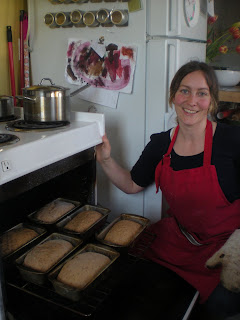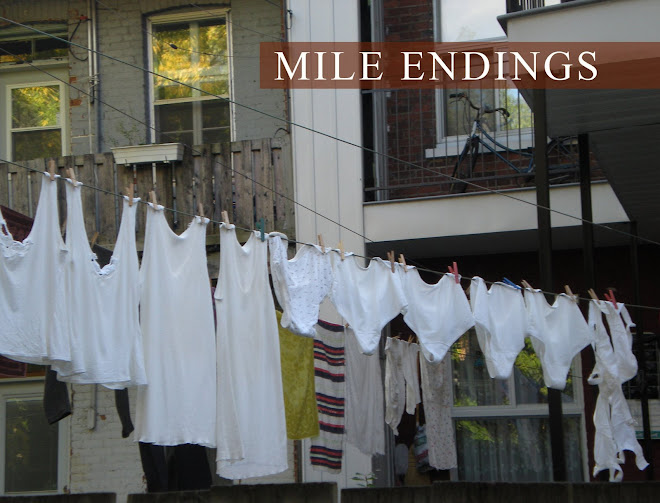
On a bright March morning J.J. Heffring, who looks like a homespun version of movie star Kate Hudson, makes bread deliveries on St. Viateur. She carries two big shopping bags of loaves and Sophie, her three-year-old daughter, scoots along beside her on a pink bike with training wheels.
The first stop is Salon Dorothy, where J.J. gives a loaf of warm homemade bread to owner Josie Paris who hands her $5 and refuses change saying, "No, no, no! You bring it all the way here, no!"
J.J. and Sophie move on, waving and calling out "Hi Tommy!" as they pass the barber who still has the postcard they sent him from their summer vacation on display in his shop.
It's as though J.J. has been living here happily forever, but when she and her filmmaker husband Jesse, first arrived in Montreal in 2001, she cried. She was three months pregnant with their oldest daughter, Zoe, and the grey streets and grime of the city made her want to turn the car around and go back to Calgary, where they'd been living, or to rural Saskatchewan, where she'd grown up.
Now she knows all the shopkeepers along St. Viateur by their first names. "That's how I've tried to cultivate a community for my girls because I don't have grandparents or parents here," explains J.J. who's named after her two grandfathers, Joshua and John.
 The organic, multigrain bread she sells for $4.00 a loaf is her way of transporting the flavour of the prairies, and the traditions of her family, to the neighbourhood.
The organic, multigrain bread she sells for $4.00 a loaf is her way of transporting the flavour of the prairies, and the traditions of her family, to the neighbourhood."It's a prairie bread," she says. "It's gentler than many multigrain breads. It has a light crumb and a great taste with a sweetness from the wildflower honey. It's a good morning bread, a breakfast bread. A lot of the French bakeries here are fancy or artisan and it's not that. I don't do decadent. I do wholesome."
When J.J. talks about baking she inspires visions of loaves and pies cooling on a windowsill, an eyelet curtain rippling in the breeze. She is the blond blue-eyed farm girl a marketing department would invent to sell baked goods. She calls her daughters "lovey" and says things like "son of a biscuit, where are my gloves."
J.J. grew up on a farm in Saskatchewan, eight miles outside the village of St. Brieux, a field away from her grandmother. "I have memories of stubble under my feet. It tickled," she says.

"I grew up watching Grandma bake pies in the early morning and bring them out to the men working in the fields. It was normal to haul a roast out of the oven at 11 in the morning. We put hot tea in sealer jars and stuck them in wool socks to keep them warm."
On her St. Viateur bread route, J.J. hooks a bag of bread onto the door at S.W. Welch's Bookseller's. Stephen Welch got to know J.J. when she came in to browse cookbooks and, as fellow foodies, they bonded. He's been getting her bread for a year now. "It's healthy, good bread. It's really not expensive and it's delivered," he says. "I like it fresh, with my natural peanut butter."
Sophie and J.J. cross Parc Avenue and head to the YMCA where a dozen mothers at the play-group are waiting for their fresh loaves. These are her core clients.
"It all started when I brought a loaf and jam to a casual play-group at someone's house last winter," J.J. says. "One of the moms there, said, 'oh can you make me one?'"
 "I think it's a cool idea, a farm girl from Saskatchewan baking in her house," says Stella Furquim, J.J.'s first customer. "The price is fair and the most important thing, my son likes it. It's so hard to get kids to eat healthy bread! Maybe it's the honey in it." Stella told two friends about "J.J. bread," as it's called in her household, and they told two friends and so on.
"I think it's a cool idea, a farm girl from Saskatchewan baking in her house," says Stella Furquim, J.J.'s first customer. "The price is fair and the most important thing, my son likes it. It's so hard to get kids to eat healthy bread! Maybe it's the honey in it." Stella told two friends about "J.J. bread," as it's called in her household, and they told two friends and so on.By April 2008, J.J. was making six loaves a week for moms she knew. From there, word of mouth spread. She now bakes three dozen loaves a week, some for people she barely knows.
At 6 a.m. while her family is still sleeping, J.J. blends ground flaxseed, quinoa and millet together with stone-ground wheat, eggs, honey, salt and yeast. The quinoa is her variation on a recipe from her dad, the bread baker in the family. He's given her a Bosch mixer for the process and also a mill that she hopes to use to make her own fresh flour, once she can find a wheat supplier.
"My dad always said a good loaf squeaks when you knead it," she says, punching the dough into loaves in her compact, sunny third-floor kitchen. In her narrow apartment-sized oven, she can only fit six loaves at a time.

Her Monday customers pick up their loaves from J.J.'s doorstep and leave money in the envelope provided.
"I started to get upset because I hadn't met all the people I was baking for," says J.J.. "So, I'd hover around the door waiting and say, 'Hi, I'm J.J. and here's your loaf.' I like a hands-on approach."
She's crunched the numbers and found she really isn't making much on this venture. "But it's not about that right now," she says. "It's about getting me out there, getting loyalty, then maybe eventually opening a bakery."
In the meantime, she'd like to expand, but not by too much. Given her current set-up, she could increase her output by about 24 more loaves a week.
All the customers I talk to are fans of "J.J. bread" and they especially like taking part in this most micro of local businesses. "I want to support her. She's sweet," says Nancy Ho, whose one-and-a-half-year-old son, Louis, loves the bread.

Postscript - November 2009: J.J. has suspended her bread baking and pick-up/delivery service. She and her husband have bought a place and are moving out of the neighbourhood. Little do the residents of Hochelaga-Maisonneuve know what's in store for them...









